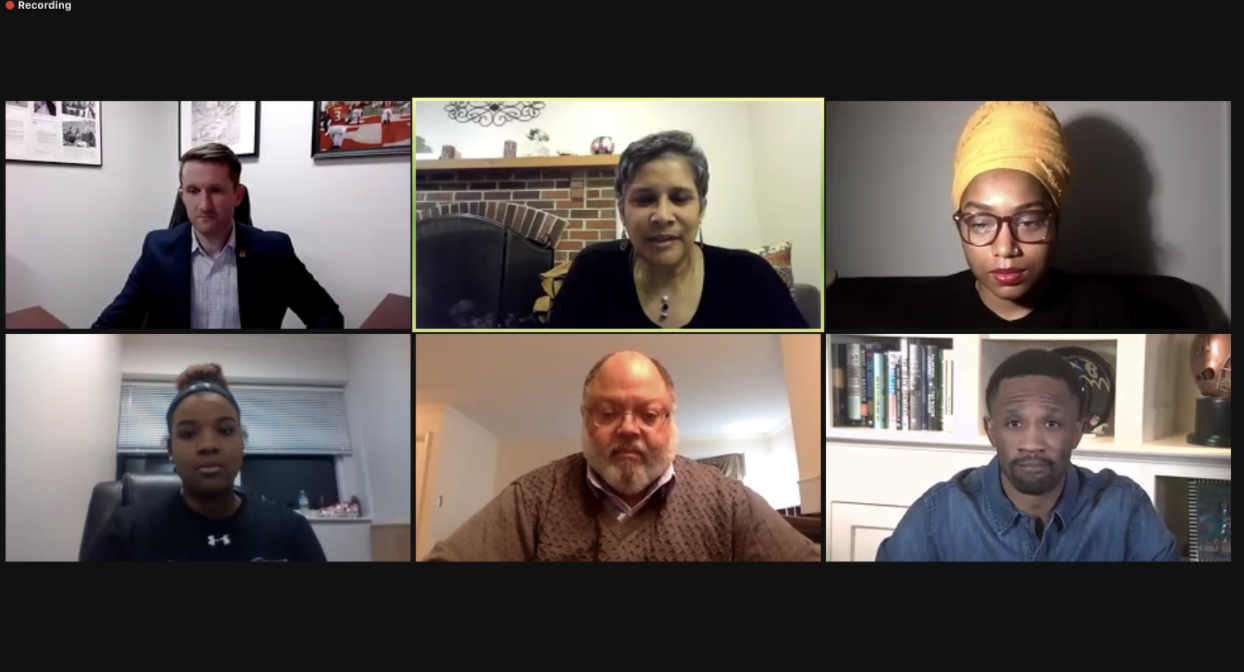A University of Maryland softball player, two sports journalists and the president of this university’s NAACP chapter came together for a webinar Wednesday night to discuss racial justice in sports.
The panel — which was moderated by Cynthia Edmunds, senior associate athletic director for diversity, equity and inclusion, and Jordan Looby, the assistant athletic director for marketing strategy and fan experience — featured discussions of their shared experiences as Black people in their respective work in sports.
Edmunds kicked off the conversation by discussing the history and importance of sports activism — a practice dating back to the late 1800s that she said has “grown into this powerful movement for social, systemic and behavioral change.”
“I feel like it’s particularly illuminated now, because it’s not just about specific incidences that folks are protesting against,” she said. “It’s really about galvanizing a movement. And not just for racial justice but for racial humanity.”
Panelists continued the discussion by outlining their own experiences with how the difficulties of speaking out about racial issues as a Black person.
Senior kinesiology major and Maryland softball player Taylor Wilson said it’s important to “humanize athletes and listen to what they have to say” instead of just viewing them as players on the field. Still, it can be hard to speak up — as one of the three Black girls on the softball team, sometimes it’s uncomfortable to be the one speaking up about racial issues, she said.
“[It’s] awkward for us to have to speak up and say ‘Hey, this is hurting me and I need your help because I can’t do it by myself,” she said.
However, it’s critical to be vulnerable in those moments and speak your mind to those inside and outside of your immediate circle, Wilson said.
[Maryland women’s soccer is unapologetically Black, and it wants young Black girls to know]
David Steele, an alumnus of this university and a sports journalist, said talking about race issues in sports can sometimes be hard for journalists as well.
“Sometimes the people who we’re closest to, sitting next to you in the press box, sitting next to you in the dugout or working with you in a locker room or clubhouse,” Steele said, “are the ones who are against you and really would rather see you just be quiet.”
Steele highlighted the pushback he sometimes receives from co-workers, superiors and his audience about mixing sports and racial justice in his writing.
“[There’s] this whole other audience, which makes up really the overwhelming majority, telling you, ‘Why are you talking about this?’ or ‘Why are you bringing this up?’, ‘Why can’t this just be fun?’, ‘Why can’t this be my escape?’” he said.
However, he said he feels it is his job to share these stories.
“It hurts. It really hurts,” he said. “And there’s still that responsibility that you feel as this person who took this on willingly at your career and as a cause, to continue to do it and fight through.”
[“A beautiful game”: Soccer has provided reflection and comfort for Isaac Ngobu]
Domonique Foxworth, an alumnus of this university, former NFL player and senior writer at The Undefeated, agreed. He said that while sometimes it can feel like the only ways to have an impact are to “kneel for the national anthem or … protest in the streets or … get hit with pepper spray,” that’s not necessarily true.
As a Black reporter, Foxworth thinks telling and reframing the stories of Black athletes makes an impact in itself. However, Foxworth said there is frustration in carrying the burden, as a Black man in a predominantly white industry, to talk about racial issues.
“It’s not our responsibility or obligation to fix the problem — or several problems — that we haven’t created,” he said. “That being said, it also affects us the most.”
However, having Black voices writing these stories is important, especially when there is implicit bias seeping into sports stories that paint Black athletes more as “power machines” and less as human beings, added fellow panelist Zahrah Siddiq.
“In the long history of professional sports, it’s always been white men covering athletes, no matter what they look like,” Foxworth said. “They let their biases seep into their coverage and that coverage seeps into the minds of kids who are watching their people.”
It is important, then, for people not a part of marginalized communities to truly listen to the experiences of Black people for what they are and hear what they have to say, Steele and Wilson said.
“Pay Black people what they’re worth. Listen to Black people, and listen to understand,” Wilson said.



